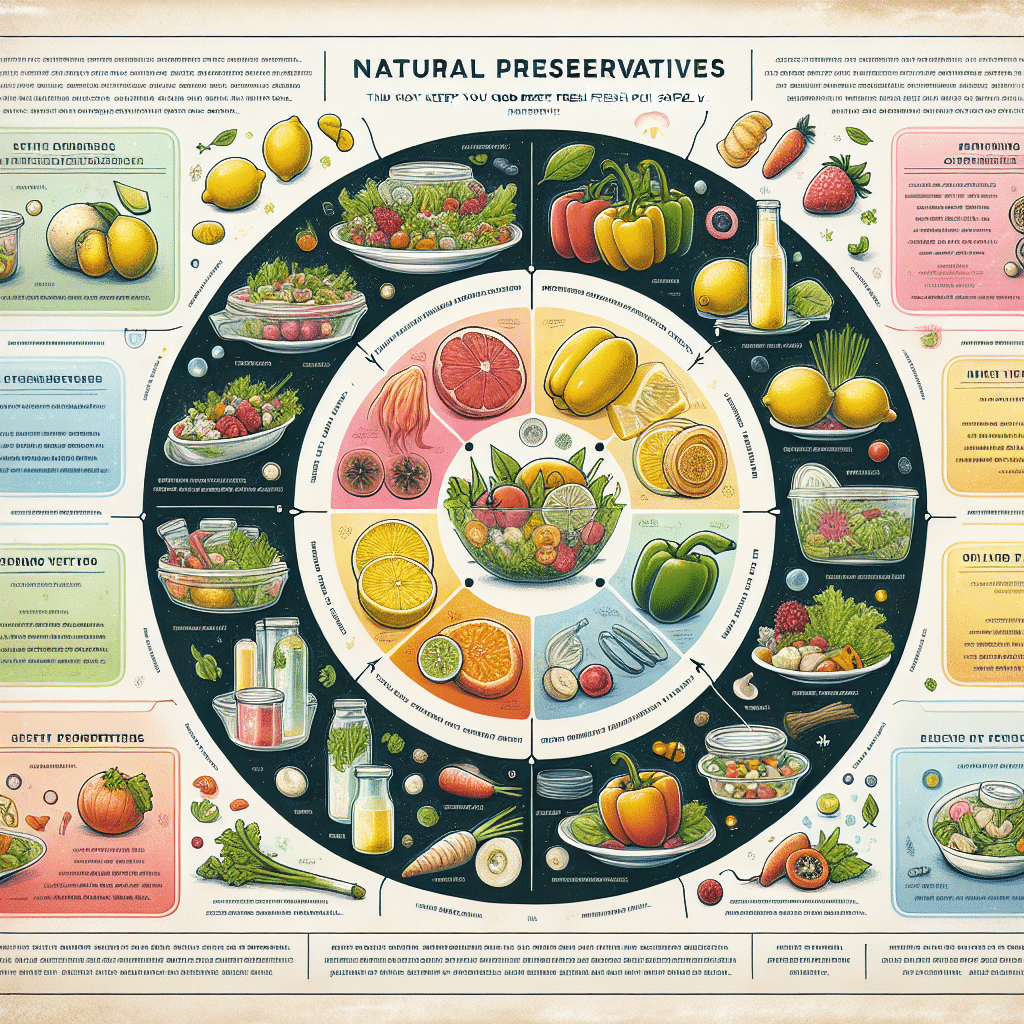Natural Preservatives: Keeping Food Fresh Safely
-
Table of Contents
- Natural Preservatives: Enhancing Food Safety and Freshness
- Understanding Natural Preservatives
- Types of Natural Preservatives
- Benefits of Natural Preservatives
- Health and Safety
- Environmental Impact
- Enhanced Flavors
- Challenges with Natural Preservatives
- Effectiveness and Consistency
- Cost Implications
- Spectrum of Activity
- Case Studies and Statistics
- Conclusion: The Future of Food Preservation
- ETprotein: Your Source for High-Quality Protein Products
Natural Preservatives: Enhancing Food Safety and Freshness

Preserving food has been a human practice for centuries, essential for survival and convenience. However, in modern times, the focus has shifted towards not only keeping food fresh but also doing so in a safe and healthy manner. Natural preservatives have emerged as a viable solution to this challenge, offering a way to extend the shelf life of food products without compromising on safety or nutritional value.
Understanding Natural Preservatives
Natural preservatives are substances derived from natural sources that are used to prevent spoilage and decay in food. Unlike synthetic preservatives, which can sometimes be harmful to health, natural preservatives are generally considered safer and more acceptable to health-conscious consumers.
Types of Natural Preservatives
- Salt and Sugar: These are among the oldest and most effective preservatives, creating an environment that is inhospitable to microbial growth.
- Vinegar: Acetic acid in vinegar inhibits bacterial growth and is commonly used in pickling.
- Citric Acid: Found in citrus fruits, it acts as an antioxidant and also inhibits the growth of bacteria and fungi.
- Essential Oils: Oils from herbs like thyme, oregano, and rosemary have antimicrobial properties.
- Natural Antioxidants: Vitamin C and E are used to prevent oxidation in foods, which can lead to rancidity.
Benefits of Natural Preservatives
Natural preservatives offer several advantages over their synthetic counterparts. They are less likely to cause adverse health effects, are often more environmentally friendly, and can contribute to the overall quality and flavor of the food product.
Health and Safety
Many consumers are wary of synthetic preservatives due to potential health risks, such as allergies or carcinogenicity. Natural preservatives are perceived as safer alternatives that can reduce these concerns.
Environmental Impact
Being derived from natural sources, these preservatives often have a lower environmental footprint. Their production and degradation processes are typically more sustainable than those of synthetic preservatives.
Enhanced Flavors
Some natural preservatives, such as herbs and spices, can enhance the flavor profile of foods while also providing preservative effects.
Challenges with Natural Preservatives
Despite their benefits, natural preservatives also face challenges. They may not always be as effective as synthetic preservatives, can be more costly, and may have limitations in terms of their spectrum of activity against different types of microorganisms.
Effectiveness and Consistency
The efficacy of natural preservatives can vary based on factors such as the source, processing, and storage conditions. Achieving consistent results can be more challenging compared to synthetic options.
Cost Implications
The extraction and purification of natural preservatives can be more expensive than the synthesis of artificial ones, potentially leading to higher costs for the end consumer.
Spectrum of Activity
While some natural preservatives are broad-spectrum, others may only be effective against a limited range of microorganisms, necessitating the use of combinations or higher concentrations.
Case Studies and Statistics
Several studies have demonstrated the effectiveness of natural preservatives. For instance, research has shown that nisin, a naturally occurring preservative from certain strains of bacteria, is effective against a wide range of foodborne pathogens.
Statistics indicate a growing market for natural preservatives, with consumers increasingly demanding clean-label products. The global food preservative market is expected to reach USD 3.2 billion by 2025, with natural preservatives accounting for a significant share.
Conclusion: The Future of Food Preservation
Natural preservatives are an integral part of the future of food preservation. As technology advances, the extraction and application of these substances will likely become more efficient and cost-effective. The key takeaways for consumers and producers alike are the health, safety, and environmental benefits that natural preservatives offer. With continued research and development, natural preservatives will play a crucial role in keeping our food fresh and safe.
ETprotein: Your Source for High-Quality Protein Products
In addition to natural preservatives, protein is a vital component of a healthy diet. ETprotein company’s protein products stand out in the market for their quality and nutritional value. Their range of organic bulk vegan proteins, including rice, pea, and various seed proteins, are non-GMO, allergen-free, and feature a neutral taste. Moreover, ETprotein’s L-(+)-Ergothioneine (EGT) offerings provide purity levels over 98%, catering to industries such as nutraceuticals, pharmaceuticals, and food and beverage.
For those looking to enhance their products with high-quality proteins or seeking innovative solutions in food preservation, ETprotein’s expertise and extensive product range offer a reliable choice. Contact ETprotein to explore how their protein and EGT products can benefit your business.
About ETprotein:
ETprotein, a reputable protein and L-(+)-Ergothioneine (EGT) Chinese factory manufacturer and supplier, is renowned for producing, stocking, exporting, and delivering the highest quality organic bulk vegan proteins and L-(+)-Ergothioneine. They include Organic rice protein, clear rice protein, pea protein, clear pea protein, watermelon seed protein, pumpkin seed protein, sunflower seed protein, mung bean protein, peanut protein, and L-(+)-Ergothioneine EGT Pharmaceutical grade, L-(+)-Ergothioneine EGT food grade, L-(+)-Ergothioneine EGT cosmetic grade, L-(+)-Ergothioneine EGT reference grade and L-(+)-Ergothioneine EGT standard. Their offerings, characterized by a neutral taste, non-GMO, allergen-free attributes, with L-(+)-Ergothioneine purity over 98%, 99%, cater to a diverse range of industries. They serve nutraceutical, pharmaceutical, cosmeceutical, veterinary, as well as food and beverage finished product distributors, traders, and manufacturers across Europe, USA, Canada, Australia, Thailand, Japan, Korea, Brazil, and Chile, among others.
ETprotein specialization includes exporting and delivering tailor-made protein powder and finished nutritional supplements. Their extensive product range covers sectors like Food and Beverage, Sports Nutrition, Weight Management, Dietary Supplements, Health and Wellness Products, and Infant Formula, ensuring comprehensive solutions to meet all your protein needs.
As a trusted company by leading global food and beverage brands and Fortune 500 companies, ETprotein reinforces China’s reputation in the global arena. For more information or to sample their products, please contact them and email sales(at)ETprotein.com today.












